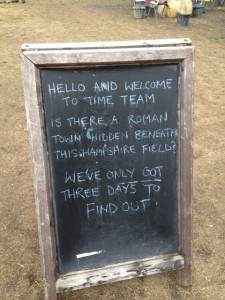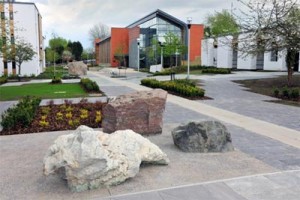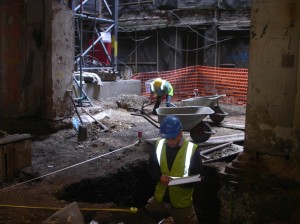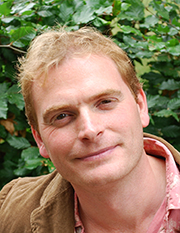Glass half empty? Fieldwork is uncomfortable – let’s be honest about it. We are usually stuck in the middle of a field in the middle of nowhere – nothing convenient about that. And talking of convenient – one of the first tasks I ALWAYS do, regardless of whether on a 2-day geophysics escapade or a 6-month road scheme, is to work out the toilet arrangements. That may sound trivial – but believe me to women on fieldwork – and probably some men too – the proximity of the nearest convenience is what it is all about!  And then there is the weather……a never ending topic of conversation in any site hut. But the weather IS all important…too much of it and you are destined to sit in a pool of mud for days on end, vainly searching for context differences; not enough and you are consigned to digging soil set like concrete whilst vainly trying to keep the sun off your neck and the back of your knees. My most dreaded and unlooked for Silchester experience was planning what to do with 130 people during a rainy day….25 people sent to work on Finds, 10 people to the Science hut, 15 people to work on site records – that still leaves over 60 people thumb twiddling in a leaking marquee. Other fieldwork challenges: earwigs in tea and tent; learning to live with the feeling that you are actually sharing your one-person tent with 78 other people (who all snore), never finding anything in ‘your’ patch on site, and a dawning comprehension that there are at least a dozen different ways to effectively remove dirt.
And then there is the weather……a never ending topic of conversation in any site hut. But the weather IS all important…too much of it and you are destined to sit in a pool of mud for days on end, vainly searching for context differences; not enough and you are consigned to digging soil set like concrete whilst vainly trying to keep the sun off your neck and the back of your knees. My most dreaded and unlooked for Silchester experience was planning what to do with 130 people during a rainy day….25 people sent to work on Finds, 10 people to the Science hut, 15 people to work on site records – that still leaves over 60 people thumb twiddling in a leaking marquee. Other fieldwork challenges: earwigs in tea and tent; learning to live with the feeling that you are actually sharing your one-person tent with 78 other people (who all snore), never finding anything in ‘your’ patch on site, and a dawning comprehension that there are at least a dozen different ways to effectively remove dirt.
And from our foreign correspondent I love that moment when you step off a ‘plane into a new culture, a new environment – a new archaeology. Never let the fact that you may not be familiar with the material culture and archaeology and history of (say) Belize stop you! I believe that once you have been (properly) taught the basics of excavation and recording (as we do at Silchester) – then the world is literally your archaeological oyster. You can dig anywhere – and see the world. And this is what I did – Lebanon, Central America, St. Kilda, Minorca, Jamaica. Setting up Field Schools – and working – abroad can be exceptionally challenging. It can take a while to find your routine and to become comfortable enough in the new environment to enjoy the archaeology. It is hard to experience the thrill of archaeological discovery for example when working amongst the worlds’ deadliest snakes. I once spent 2 weeks being observed on a daily basis by a python in a tree overhanging the trench – an experience which concentrated the mind beautifully. Luckily it had just eaten. Showering in a jungle with my boots on to avoid scorpions and baby snakes can also temper enjoyment. But, the archaeological excitement will and can balance out any negativity, and without a doubt the best field archaeologists I have ever encountered have been the local workmen who can disentangle stratigraphy with their teeth and create a work of art out of a trowelled surface.
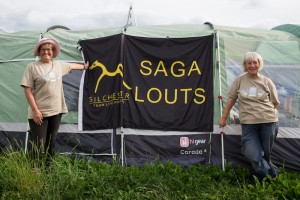 Team Silchester The success of the Silchester Field School is based on team and community spirit. People just seemed to love it. I pride myself on the quality of teaching we delivered, and also on our high standard of excavation and recording, regardless of external time pressures. My supervisors were amongst the best in the world; and most of them started their adult lives as students at the Department of Archaeology at Reading, and subsequently at the Silchester Field School. It is a legacy to be proud of. However I cannot claim any credit for the juggernaut that is the Field School – I simply facilitated it each and every year. The head of successful steam was entirely built up by people who loved it, benefited from it personally and professionally, spread the word, and wanted to return year after year. Every dig has its fans of course, but an 18 year excavation inspires a special kind of devotion.
Team Silchester The success of the Silchester Field School is based on team and community spirit. People just seemed to love it. I pride myself on the quality of teaching we delivered, and also on our high standard of excavation and recording, regardless of external time pressures. My supervisors were amongst the best in the world; and most of them started their adult lives as students at the Department of Archaeology at Reading, and subsequently at the Silchester Field School. It is a legacy to be proud of. However I cannot claim any credit for the juggernaut that is the Field School – I simply facilitated it each and every year. The head of successful steam was entirely built up by people who loved it, benefited from it personally and professionally, spread the word, and wanted to return year after year. Every dig has its fans of course, but an 18 year excavation inspires a special kind of devotion.
The Transformers And the Field School did literally change the lives of many people. Some of my most inspiring – and humbling – moments have been watching tentative, socially fragile students develop from pale, shrinking mud-averse undergraduates to confident, tanned, trowel-wielding individuals who build up social networks they will retain forever, and develop a rainbow of skills which will carry them through life. Not bad for a hole in the ground!
Blank Page In my book, fieldwork is the beginning of it all – that first tentative  sentence of a whole chapter of new research, the beginnings of a love of all things outdoors, the start of diverse skills and adventures. Nothing can ever quite match the excitement of uncovering a swirl of gravel, bounded by linear ditches, which turns out to be part of a hitherto unknown and only guessed at Iron Age street layout – its discovery giving a tantalising glimpse into the organisation of a long ago way of life. Fieldwork is the very first booted steps which will echo down the centuries – and how many things can you say that about? Many archaeology books published pay homage to that very first day of putting the boot in, putting the trowel in…..lifting the turf on Day 1 may allow a glimpse 10 years hence to a 5* publication hot off the press. It’s a wonderful motivator!
sentence of a whole chapter of new research, the beginnings of a love of all things outdoors, the start of diverse skills and adventures. Nothing can ever quite match the excitement of uncovering a swirl of gravel, bounded by linear ditches, which turns out to be part of a hitherto unknown and only guessed at Iron Age street layout – its discovery giving a tantalising glimpse into the organisation of a long ago way of life. Fieldwork is the very first booted steps which will echo down the centuries – and how many things can you say that about? Many archaeology books published pay homage to that very first day of putting the boot in, putting the trowel in…..lifting the turf on Day 1 may allow a glimpse 10 years hence to a 5* publication hot off the press. It’s a wonderful motivator!
Bullseye F ieldwork is a darts board of possibilities. A big project like Silchester has room for everyone. The most important people on any project are by no means the Directors….no, it is all about the people who dig, who uncover, who wash and scrub the artefacts, who fill bag after bag of soil, who stand with their hands in cold water day in and day out, microscopically tweezering out evidence for past lives, who communicate daily discoveries to our visitors (one of the huge successes of our Field School). But fieldwork also celebrates the (possibly) less glamorous jobs…..the site manager who picks up the litter, rescues crisp packets from food recycling bins, recovers lost mobile phones from the innards of portaloos, drives the vehicles, looks after the stores and equipment….the cook who sweats over a hot portakabin to produce meals which don’t touch the sides on the way down, and are never enough…..the project assistant who lovingly crafts the spaghetti junction lists and rotas for who does what day in, day out. A dig is a kaleidoscope of opportunities.
ieldwork is a darts board of possibilities. A big project like Silchester has room for everyone. The most important people on any project are by no means the Directors….no, it is all about the people who dig, who uncover, who wash and scrub the artefacts, who fill bag after bag of soil, who stand with their hands in cold water day in and day out, microscopically tweezering out evidence for past lives, who communicate daily discoveries to our visitors (one of the huge successes of our Field School). But fieldwork also celebrates the (possibly) less glamorous jobs…..the site manager who picks up the litter, rescues crisp packets from food recycling bins, recovers lost mobile phones from the innards of portaloos, drives the vehicles, looks after the stores and equipment….the cook who sweats over a hot portakabin to produce meals which don’t touch the sides on the way down, and are never enough…..the project assistant who lovingly crafts the spaghetti junction lists and rotas for who does what day in, day out. A dig is a kaleidoscope of opportunities.
 (Earth) Worm wisdom And if I can leave prospective fieldworkers with some advice? Firstly, just because you are in a field in the middle of nowhere does not mean that style goes out of the window along with personal hygiene. Secondly, wear layers, cherish your waterproof trousers and always have a clear sight of the portaloos. Thirdly, remember that all fieldworkers are an equal and important part of the project and always make time for everyone. And smile. And fourthly and finally – remember – it’s just a dig. Nothing more, nothing less.
(Earth) Worm wisdom And if I can leave prospective fieldworkers with some advice? Firstly, just because you are in a field in the middle of nowhere does not mean that style goes out of the window along with personal hygiene. Secondly, wear layers, cherish your waterproof trousers and always have a clear sight of the portaloos. Thirdly, remember that all fieldworkers are an equal and important part of the project and always make time for everyone. And smile. And fourthly and finally – remember – it’s just a dig. Nothing more, nothing less.






 And then there is the weather……a never ending topic of conversation in any site hut. But the weather IS all important…too much of it and you are destined to sit in a pool of mud for days on end, vainly searching for context differences; not enough and you are consigned to digging soil set like concrete whilst vainly trying to keep the sun off your neck and the back of your knees. My most dreaded and unlooked for Silchester experience was planning what to do with 130 people during a rainy day….25 people sent to work on Finds, 10 people to the Science hut, 15 people to work on site records – that still leaves over 60 people thumb twiddling in a leaking marquee. Other fieldwork challenges: earwigs in tea and tent; learning to live with the feeling that you are actually sharing your one-person tent with 78 other people (who all snore), never finding anything in ‘your’ patch on site, and a dawning comprehension that there are at least a dozen different ways to effectively remove dirt.
And then there is the weather……a never ending topic of conversation in any site hut. But the weather IS all important…too much of it and you are destined to sit in a pool of mud for days on end, vainly searching for context differences; not enough and you are consigned to digging soil set like concrete whilst vainly trying to keep the sun off your neck and the back of your knees. My most dreaded and unlooked for Silchester experience was planning what to do with 130 people during a rainy day….25 people sent to work on Finds, 10 people to the Science hut, 15 people to work on site records – that still leaves over 60 people thumb twiddling in a leaking marquee. Other fieldwork challenges: earwigs in tea and tent; learning to live with the feeling that you are actually sharing your one-person tent with 78 other people (who all snore), never finding anything in ‘your’ patch on site, and a dawning comprehension that there are at least a dozen different ways to effectively remove dirt. Team Silchester The success of the Silchester Field School is based on team and community spirit. People just seemed to love it. I pride myself on the quality of teaching we delivered, and also on our high standard of excavation and recording, regardless of external time pressures. My supervisors were amongst the best in the world; and most of them started their adult lives as students at the Department of Archaeology at Reading, and subsequently at the Silchester Field School. It is a legacy to be proud of. However I cannot claim any credit for the juggernaut that is the Field School – I simply facilitated it each and every year. The head of successful steam was entirely built up by people who loved it, benefited from it personally and professionally, spread the word, and wanted to return year after year. Every dig has its fans of course, but an 18 year excavation inspires a special kind of devotion.
Team Silchester The success of the Silchester Field School is based on team and community spirit. People just seemed to love it. I pride myself on the quality of teaching we delivered, and also on our high standard of excavation and recording, regardless of external time pressures. My supervisors were amongst the best in the world; and most of them started their adult lives as students at the Department of Archaeology at Reading, and subsequently at the Silchester Field School. It is a legacy to be proud of. However I cannot claim any credit for the juggernaut that is the Field School – I simply facilitated it each and every year. The head of successful steam was entirely built up by people who loved it, benefited from it personally and professionally, spread the word, and wanted to return year after year. Every dig has its fans of course, but an 18 year excavation inspires a special kind of devotion. sentence of a whole chapter of new research, the beginnings of a love of all things outdoors, the start of diverse skills and adventures. Nothing can ever quite match the excitement of uncovering a swirl of gravel, bounded by linear ditches, which turns out to be part of a hitherto unknown and only guessed at Iron Age street layout – its discovery giving a tantalising glimpse into the organisation of a long ago way of life. Fieldwork is the very first booted steps which will echo down the centuries – and how many things can you say that about? Many archaeology books published pay homage to that very first day of putting the boot in, putting the trowel in…..lifting the turf on Day 1 may allow a glimpse 10 years hence to a 5* publication hot off the press. It’s a wonderful motivator!
sentence of a whole chapter of new research, the beginnings of a love of all things outdoors, the start of diverse skills and adventures. Nothing can ever quite match the excitement of uncovering a swirl of gravel, bounded by linear ditches, which turns out to be part of a hitherto unknown and only guessed at Iron Age street layout – its discovery giving a tantalising glimpse into the organisation of a long ago way of life. Fieldwork is the very first booted steps which will echo down the centuries – and how many things can you say that about? Many archaeology books published pay homage to that very first day of putting the boot in, putting the trowel in…..lifting the turf on Day 1 may allow a glimpse 10 years hence to a 5* publication hot off the press. It’s a wonderful motivator! ieldwork is a darts board of possibilities. A big project like Silchester has room for everyone. The most important people on any project are by no means the Directors….no, it is all about the people who dig, who uncover, who wash and scrub the artefacts, who fill bag after bag of soil, who stand with their hands in cold water day in and day out, microscopically tweezering out evidence for past lives, who communicate daily discoveries to our visitors (one of the huge successes of our Field School). But fieldwork also celebrates the (possibly) less glamorous jobs…..the site manager who picks up the litter, rescues crisp packets from food recycling bins, recovers lost mobile phones from the innards of portaloos, drives the vehicles, looks after the stores and equipment….the cook who sweats over a hot portakabin to produce meals which don’t touch the sides on the way down, and are never enough…..the project assistant who lovingly crafts the spaghetti junction lists and rotas for who does what day in, day out. A dig is a kaleidoscope of opportunities.
ieldwork is a darts board of possibilities. A big project like Silchester has room for everyone. The most important people on any project are by no means the Directors….no, it is all about the people who dig, who uncover, who wash and scrub the artefacts, who fill bag after bag of soil, who stand with their hands in cold water day in and day out, microscopically tweezering out evidence for past lives, who communicate daily discoveries to our visitors (one of the huge successes of our Field School). But fieldwork also celebrates the (possibly) less glamorous jobs…..the site manager who picks up the litter, rescues crisp packets from food recycling bins, recovers lost mobile phones from the innards of portaloos, drives the vehicles, looks after the stores and equipment….the cook who sweats over a hot portakabin to produce meals which don’t touch the sides on the way down, and are never enough…..the project assistant who lovingly crafts the spaghetti junction lists and rotas for who does what day in, day out. A dig is a kaleidoscope of opportunities. (Earth) Worm wisdom And if I can leave prospective fieldworkers with some advice? Firstly, just because you are in a field in the middle of nowhere does not mean that style goes out of the window along with personal hygiene. Secondly, wear layers, cherish your waterproof trousers and always have a clear sight of the portaloos. Thirdly, remember that all fieldworkers are an equal and important part of the project and always make time for everyone. And smile. And fourthly and finally – remember – it’s just a dig. Nothing more, nothing less.
(Earth) Worm wisdom And if I can leave prospective fieldworkers with some advice? Firstly, just because you are in a field in the middle of nowhere does not mean that style goes out of the window along with personal hygiene. Secondly, wear layers, cherish your waterproof trousers and always have a clear sight of the portaloos. Thirdly, remember that all fieldworkers are an equal and important part of the project and always make time for everyone. And smile. And fourthly and finally – remember – it’s just a dig. Nothing more, nothing less.


